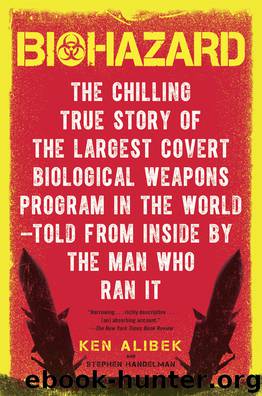Biohazard by Ken Alibek

Author:Ken Alibek [Alibek, Ken]
Language: eng
Format: epub
ISBN: 978-0-8041-5265-5
Publisher: Random House Publishing Group
Published: 2014-03-05T05:00:00+00:00
Pasechnik’s defection shook the highest levels of the Soviet government. Igor Belousov, deputy chairman of the Council of Ministers and the head of the Military-Industrial Commission, was ordered to prepare a response to the U.S.-British demarche. By February 1990, a draft was ready for the signatures of leading ministers.
Biopreparat wrote the bulk of the document. While declaring that the Soviet Union fully complied with every clause of the Biological Weapons Convention, we conceded that observers might consider some of our activities suspicious. Nevertheless we insisted that all our research into biological warfare agents was conducted for the sole purpose of defending ourselves against potential aggressors. The treaty’s ambiguous definition of biodefense work had given us an important loophole.
We also agreed to negotiate a schedule of visits to biological facilities on both sides of the cold war divide. These would not be formal inspections—the treaty didn’t require them. But our willingness to open our installations to outsiders would show our sincerity and good faith. None of us really believed that the U.S. government would take this last suggestion seriously. It would force Americans to allow us inside their own bioweapons installations.
The key Soviet leaders, including KGB chairman Vladimir Kryuchkov, Gosplan chairman Yury Maslyukov, Military-Industrial Commission head Igor Belousov, Foreign Minister Eduard Shevardnadze, and Defense Minister Dmitry Yazov, were asked to review and sign the document before it was passed on to Gorbachev for final approval. A formal diplomatic reply would then be sent to the American and British governments.
Kalinin was given the job of obtaining the signatures. He managed to secure everyone’s approval, except Shevardnadze’s. Inexplicably, the foreign minister dug his heels in. Kalinin was beside himself with anxiety.
One day he came to see me, looking suspiciously relieved.
“They’ve decided all we need is the signature of Karpov, the deputy minister, since he’s head of the disarmament department,” he announced. “You can bring the document to him.”
I headed through the midday Moscow traffic to Smolenskaya, one of the capital’s seven wedding-cake skyscrapers built by Stalin’s architects in the late 1940s and early 1950s. I didn’t need an armed guard, since there were no state secrets in my briefcase—just a portfolio of lies.
Karpov was absorbed with his papers. He looked up as if surprised to see me, though I knew he had been expecting me.
“What have you brought me, Kanatjan?” he said.
I handed him the paper and waited for him to finish reading.
“You know, young man, I see a troubled future ahead of you,” he said at last.
I was taken aback. “What do you mean?” I asked. “Look at all the others who have signed this document. I’m just the courier.”
“Kanatjan,” he said with a weary shake of his head, “I know who you are and I know what you do. And I know that none of what’s written here is true.”
“I don’t understand what you mean,” I said earnestly.
Karpov did not have Nikita Smidovich’s sense of irony. He raised his hand to stop me.
“Forget it,” he said.
He signed the document and handed it back to me.
Download
This site does not store any files on its server. We only index and link to content provided by other sites. Please contact the content providers to delete copyright contents if any and email us, we'll remove relevant links or contents immediately.
| Africa | Americas |
| Arctic & Antarctica | Asia |
| Australia & Oceania | Europe |
| Middle East | Russia |
| United States | World |
| Ancient Civilizations | Military |
| Historical Study & Educational Resources |
The Radium Girls by Kate Moore(12019)
100 Deadly Skills by Clint Emerson(4921)
Rise and Kill First by Ronen Bergman(4780)
The Templars by Dan Jones(4684)
The Doomsday Machine by Daniel Ellsberg(4485)
The Rape of Nanking by Iris Chang(4203)
Killing England by Bill O'Reilly(3997)
Stalin by Stephen Kotkin(3958)
Hitler in Los Angeles by Steven J. Ross(3942)
12 Strong by Doug Stanton(3541)
Hitler's Monsters by Eric Kurlander(3329)
Blood and Sand by Alex Von Tunzelmann(3195)
The Code Book by Simon Singh(3181)
Darkest Hour by Anthony McCarten(3119)
The Art of War Visualized by Jessica Hagy(3001)
Hitler's Flying Saucers: A Guide to German Flying Discs of the Second World War by Stevens Henry(2752)
Babylon's Ark by Lawrence Anthony(2673)
The Second World Wars by Victor Davis Hanson(2521)
Tobruk by Peter Fitzsimons(2511)
